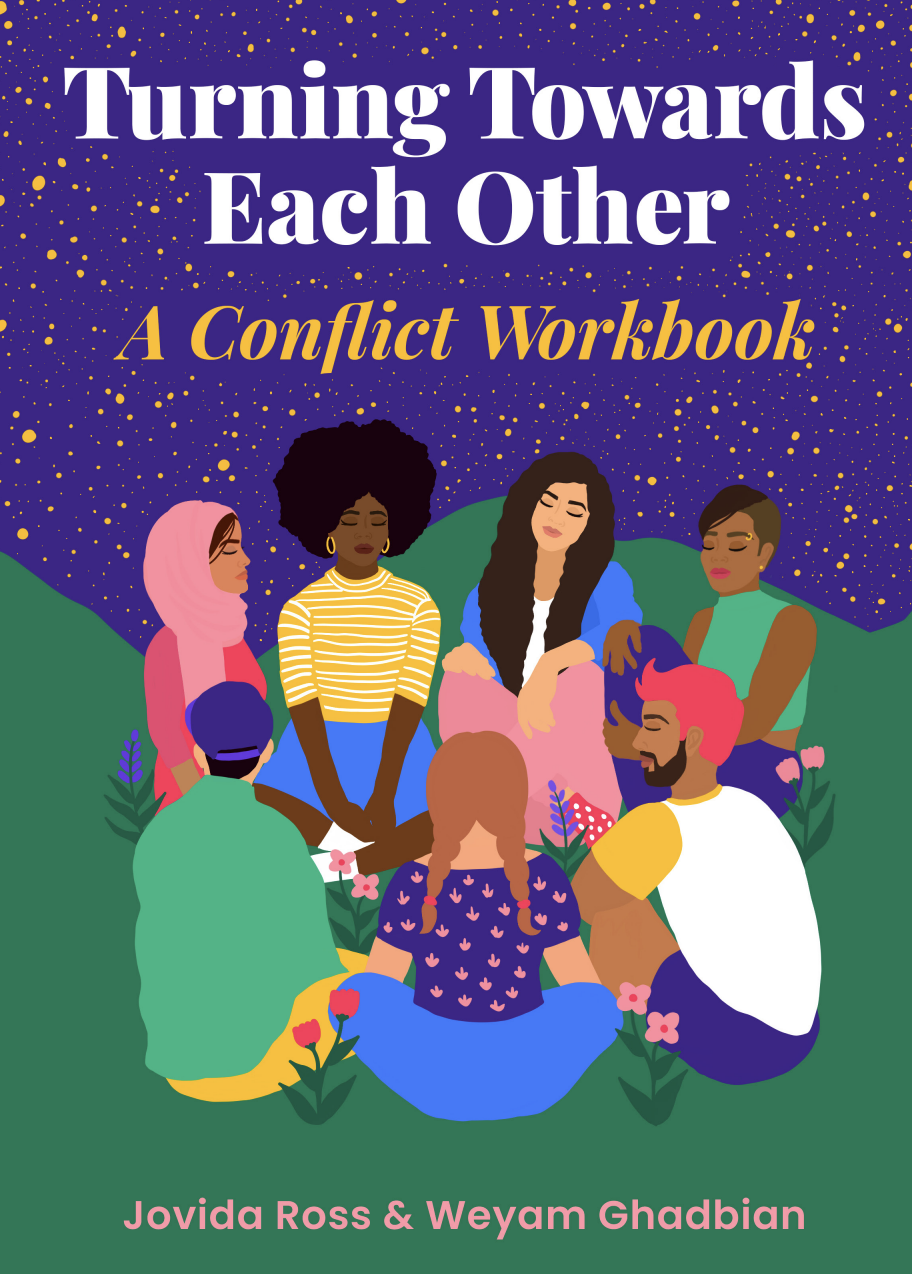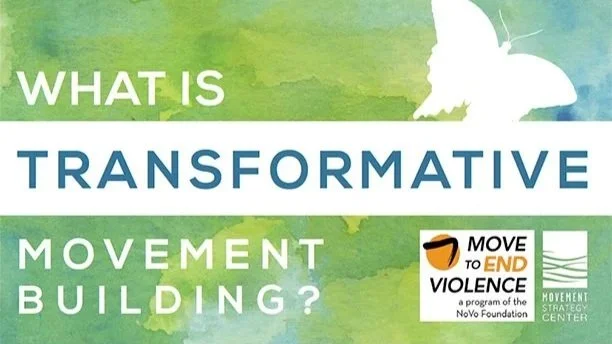Turning Towards Each Other Conflict Workbook
We created the Turning Towards Each Other Conflict Workbook in 2020 because we needed these tools ourselves—to help us move through our own lives and work in groups. The workbook is designed for groups of people working together with a shared purpose: housemates creating a home you all belong in, workplace teams working on shared projects, or any group that needs to work through differences to find your way together. The exercises bring love into the hard parts of our relationships, helping us surface deeper insights hidden in tension and uncover new solutions.
Click yellow button below to offer an optional donation, or click the image to download for free.
Click yellow button below to offer an optional donation, or click the image to download for free.
Click yellow button below to offer an optional donation, or click the image to download for free.
“Turning Towards Each Other: A Conflict Workbook” is an immensely useful guide that helps people think about what roles we fall into when we're in conflicts, what kinds of disconnecting behaviors we express during conflicts, and how to work with conflict in groups. This has been a huge resource to me. I've drawn from it in workshops that I've done about conflict for organizing groups and for a lot of mutual aid groups. And I've also taught this guide to law students for building skills to prepare for the inevitable conflict that comes up in student organizing and in law jobs.”
— Dean Spade, author of Love In A F*cked Up World
Other Stuff We’ve Published
Weyam and Dean Spade discusses the transformative power of love and insights from attachment theory on Dean’s podcast, Love in a F*cked Up World
A series orienting to movement-building practices which we put together in collaboration with many colleagues when we both worked at Movement Strategy Center. Access the recordings, slide decks, and practice guides here.
A piece co-written by Jovida and colleague Rose Elizondo called "Building a Bigger We: A Conversation on Restorative Justice Movement-Building" in Listening to the movement : essays on new growth and new challenges in restorative justice from the Zehr Institute.
An article we co-wrote with colleague, Ingrid Benedict on our learnings from movement conflicts in Nonprofit Quarterly.
An article Jovida co-wrote with colleagues Shizue Roche-Adachi and Julie Quiroz in Nonprofit Quarterly on the life-affirming culture shift required to honor our foodways.
Further Recommended Resources
Books
When No Thing Works
Norma Ryuko Kawelokū Wong Roshi is a Zen teacher, political strategist, and storyteller. She has influenced this work in many ways, including strategy as navigation, situating ourselves within a multigenerational arc, and prefiguring the world we envision through embodied, regular everyday actions. Her book is a concise expression of many of her core principles.
Beyond Inclusion, Beyond Empowerment: A Developmental Strategy to Liberate Everyone
Leticia Nieto has some great insights on power-awareness in this comprehensive book
The Power Manual
Cyndi Suarez shaped our thinking on liberatory vs. supremacist power via her book The Power Manual: How to Master Complex Power Dynamics.
Love In A F*cked Up World
Dean Spade’s book supports individuals to combat dominant cultural scripts and take our relationships into our own hands, so we can stick together while we work for survival and liberation.
Brave New Work
Aaron Dignan of The Ready, a consulting firm which has adapted many tools and practices from Sociocracy, offers a lot of useful tools and frameworks in this book.
My Grandmother’s Hands
Resmaa Menakem’s My Grandmother's Hands offers a body-centered understanding of white supremacy, and invites us to approach healing through the body, not just the mind.
Group Process, Toolkits, + Curricula
In It Together Framework
This toolkit by Interrupting Criminalization and Dragonfly Partners is a useful index of tools and frameworks for conflict transformation in movement-building groups.
Against Punishment Curriculum
Mariame Kaba’s Against Punishment curriculum offers some of the activities she developed, co-created, and found over years of creating and facilitating workshops that give people the space to articulate what true justice might feel like for them.
Circle Forward
Our colleagues at Circle Forward helped shape our understanding of consent as a principle for working in groups.
Nonviolent Communication
Our approach to courageous conversations is informed by nonviolent communication (NVC), developed by Marshall Rosenberg, as well as by the many critiques of NVC that it can be used in a way that is restrictive and reinforces supremacist cultural patterns. Here’s one resource on this from somatic practitioner Meenadchi.
Syntara System School of Energy Awareness
Weyam has studied with Gitanjali Laila D’Costa via the Syntara System School of Energy Awareness. Gitanjali generously shared the Four Archetypes in Conflict framework with us (included in the Turning Towards Each Other workbook and the basis for our Intensive workshop on Unlocking Conflict Habits).
White Supremacy Culture Characteristics
We’ve found Tema Okun’s work on white supremacy culture to be helpful, particularly in understanding that supremacist patterns are cultural, and that we’re all steeped in them, regardless of identity. She gave us permission to adapt her work in the Turning Towards Each Other Workbook, which we described as “Dominant Culture Check” and paired with Practices that Cultivate Mutuality. On this page she cautions about “weaponizing” the framework (scroll down to find that section).
Articles
Shannon Perez-Darby on Accountability
Shannon Perez-Darby’s insights on Self Accountability, Centered Self-Accountability, and Self-Accountability inform our understanding that genuine accountability requires agency and consent.
“The Liberatory World We Want to Create: Loving Accountability and the Limitations of Cancel Culture”
by Aja Couchois Duncan and Kad Smith in Nonprofit Quarterly advocates for replacing "cancel culture" with a healing-centered approach when addressing harm. We particularly appreciate their articulation of "meaningful consequences—not as punishment but rather as ensuring the health of the collective through meaningful boundaries" that are "firm and porous as skin."
How To Be An Antiracist Supervisor
by Kim-Monique Johnson in the Nonprofit Quarterly names some hard truths about the origin of “Supervision” and how that shows up in modern management practice, then offers ideas for “stitching a new garment.”
Peer Practitioners / Referrals
We have so much respect for colleagues doing similar work. These are some of the folks whose perspective resonates with ours, who we’ve connected with in some way. This is by no means a comprehensive list; there are many others!






